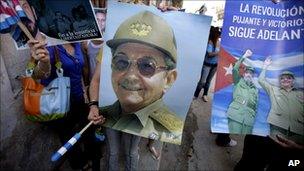Cuba releases dissidents Felix Navarro and Jose Ferrer
- Published

President Raul Castro agreed to release the dissidents last July but with conditions
The Cuban government has freed the last two dissidents still in jail after a crackdown on opposition activists in 2003.
Jose Ferrer and Felix Navarro were among 75 opponents of the government arrested eight years ago.
The dissidents' freedom was brokered by the Roman Catholic Church last year, with most agreeing to go into exile.
The remaining prisoners had refused to leave the island.
Mr Navarro, 57, a teacher and political activist, and 40-year-old Mr Ferrer, a fisherman, who were both serving 25-year sentences, were freed early on Wednesday.
"My dad is in great spirits, very upbeat, very happy - and prepared to pick up where he left off in 2003," Mr Navarro's daughter, Sayli, told the AFP news agency.
There was similar jubilation for Mr Ferrer and his family.
"It was a really emotional reception. All the family was waiting for me and I am going to devote my first days to them, before taking up the struggle again," Mr Ferrer told the Spanish news agency, Efe.
He said he believed the Cuban government had been obliged to free the dissidents, but the releases did not signify that there had been political change.
"Cuba's prisons are full and there is all kinds of criminals in them, as well as a lot of victims of the regime," Mr Ferrer said via telephone from his home in the eastern city of Santiago de Cuba.
Unfair trials
Last July, Cuban President Raul Castro agreed after talks with Catholic Church leaders to free the 52 dissidents still behind bars after the 2003 crackdown.
Most were released in the following weeks and went into exile in Spain, but several, including Mr Navarro and Mr Ferrer, stayed in jail because they refused to leave Cuba.
Earlier this year, the authorities began releasing the remaining dissidents without insisting they go into exile.
Reacting to news of the latest releases, Amnesty International said the activists should never have been jailed in the first place.
"The release of all prisoners of conscience from the March 2003 crackdown and an activist detained last December is a step in the right direction for human rights in Cuba," said Amnesty Cuba expert Gerardo Ducos.
"What we want to see now is for the Cuban authorities to not force activists into exile as a condition for their release and to ensure all human rights activists are able to carry out their legitimate work without fear of threat, harassment, further arrests or unfair trials in their own country."
The mass arrests in 2003, which became known as Cuba's Black Spring, provoked widespread international condemnation.
The European Union called off co-operation with the island, which was only officially resumed in 2008.
Cuba denies holding any political prisoners, saying they are mercenaries in the pay of the US to destabilise the government.
- Published24 March 2011
- Published12 March 2011
- Published19 February 2011